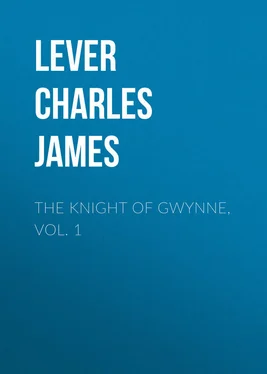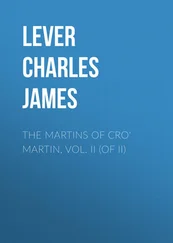Charles Lever - The Knight Of Gwynne, Vol. 1
Здесь есть возможность читать онлайн «Charles Lever - The Knight Of Gwynne, Vol. 1» — ознакомительный отрывок электронной книги совершенно бесплатно, а после прочтения отрывка купить полную версию. В некоторых случаях можно слушать аудио, скачать через торрент в формате fb2 и присутствует краткое содержание. Жанр: foreign_antique, foreign_prose, на английском языке. Описание произведения, (предисловие) а так же отзывы посетителей доступны на портале библиотеки ЛибКат.
- Название:The Knight Of Gwynne, Vol. 1
- Автор:
- Жанр:
- Год:неизвестен
- ISBN:нет данных
- Рейтинг книги:3 / 5. Голосов: 1
-
Избранное:Добавить в избранное
- Отзывы:
-
Ваша оценка:
- 60
- 1
- 2
- 3
- 4
- 5
The Knight Of Gwynne, Vol. 1: краткое содержание, описание и аннотация
Предлагаем к чтению аннотацию, описание, краткое содержание или предисловие (зависит от того, что написал сам автор книги «The Knight Of Gwynne, Vol. 1»). Если вы не нашли необходимую информацию о книге — напишите в комментариях, мы постараемся отыскать её.
The Knight Of Gwynne, Vol. 1 — читать онлайн ознакомительный отрывок
Ниже представлен текст книги, разбитый по страницам. Система сохранения места последней прочитанной страницы, позволяет с удобством читать онлайн бесплатно книгу «The Knight Of Gwynne, Vol. 1», без необходимости каждый раз заново искать на чём Вы остановились. Поставьте закладку, и сможете в любой момент перейти на страницу, на которой закончили чтение.
Интервал:
Закладка:
At the end of the room a group of some twenty persons stood or sat around a chair in which a thin elderly gentleman was seated, his fine and delicately marked features far more unequivocally proclaiming rank than even the glittering star he wore on his breast. Without being in reality very old, Lord Drogheda seemed so, for, partly from delicacy of health, and partly, as some affirmed, from an affectation of age (a more frequent thing than is expected), he had contracted a stoop, and walked with every sign of debility.
“Well, gentlemen, how does time go?” said he, with an easy smile. “Are we not near the hour?”
“Yes; it wants but eleven minutes of ten now, my Lord,” said one of the group. “Do you mean to hold him sharp to time?”
“Egad, I should think so,” interrupted a red-whiskered squire, in splashed top-boots. “I’ve ridden in from Kildare to-night to see the match, and I protest against any put-off.”
Lord Drogheda turned his eyes towards the speaker with a look in which mildness was so marked, it could not be called reproof, but it evidently confused him, as he added, “Of course, if the gentlemen who have heavy wagers on it are content I must be also.”
“I, for one, say ‘sharp time,’” cried out a dapperly dressed young fellow, with an open pocket-book in his hand; “play or pay is the only rule in these cases.”
“I ‘ve backed my Lord at eight to ten, in hundreds,” said another, “and certainly I ‘ll claim my bet if the Knight is one minute late.”
“Then you have just three to decide that question,” said one at his side. “My watch is with the Post-office.”
“Quite, time enough left to order my carriage,” said Lord Drogheda, rising with an energy very different from his ordinary indolent habit. “If the Knight of Gwynne should be accidentally delayed, gentlemen, I, for my part, prefer being also absent. It will then be a matter of some difficulty for the parties betting to say who is the delinquent.” He took his hat as he spoke, and was moving through the crowd, when a sudden cheer from without was heard, and then, almost the instant after, a confused sound of acclamation as the Knight of Gwynne entered, leaning on the arm of Con Heffernan. Making his way with difficulty through the crowd of welcoming friends and acquaintances, the Knight approached the end of the room where Lord Drogheda now awaited him, standing.
“Not late, my Lord, though very near it,” said he, extending his hand. “If I should apologize, however, I have an excuse you will not reject, – Con Heffernan’s Burgundy is hard to part with.”
“Very true, Knight,” said his Lordship, smiling. “With a friend one sees so seldom, a little dalliance is most pardonable.”
This sarcasm was met by a ready laugh, for Heffernan was better known as a guest at other tables than a host at his own; nor did he, at whose expense the jest was made, refrain from joining in the mirth, while he added, —
“The Burgundy, like one of your Lordship’s bons mots , is perhaps appreciated the more highly because of its rarity.”
“Very true, Heffernan,” replied Lord Drogheda; “we should keep our wit and wine only for our best friends.”
“Faith, then,” whispered the red-whiskered squire who spoke before, “if the liquor does not gain more by keeping than the wit, I’d recommend Con to drink it off a little faster.”
“Or, better still,” interposed the Knight, “only give it to those who understand its flavor. But we are, if I mistake not, losing very valuable time. What say you to the small room off the library, or will your Lordship remain here?”
“Here, if equally agreeable to you. We are both of us too old in the harness to care much for being surrounded by spectators.”
“Is it true, Con,” said a friend in Heffernan’s ear, “that Darcy has laid fifty thousand on this party?”
“I believe you are rather under than over the mark,” whispered Heffernan. “The wager has been off and on these last eight or ten years. It was made at Hutchinson’s one evening when we all had drunk a good deal of wine. At first, whist was talked of; but Drogheda objected to Darcy’s naming Vicars as his partner.”
“More fool he! Vicars is a first-rate player, but confoundedly unlucky.”
“Be that as it may, they fixed on piquet as the game, and, if accounts be true, all the better for Darcy. They say he has beaten the best players in France.”
“And what is really the stake? One hears so many absurd versions of it.”
“The Ballydermot property.”
“The whole of it?”
“Every acre, with the demesne, house, plate, pictures, carriages, wine, – begad! I ‘m not sure if the livery servants are not included, – against fifty thousand pounds. You know Drogheda has lent him a very large sum on a mortgage of that property already, and this will make the thing about double or quits.”
“Well, Heffernan,” cried the Knight, “are you making your book there? When you’ve quite finished, let me have a pinch of that excellent snuff of yours.”
“Why not try mine?” said Lord Drogheda, pushing a magnificently jewelled box, containing a miniature, across the table.
“‘T would be a bad augury, my Lord,” said Darcy, laughing. “If I remember aright, you won this handsome box from the Duke de Richelieu.”
“Ah! you know that story, then?”
“I was present at the time, and remember the circumstance perfectly. The King was leaning over the Duke’s chair, watching the game – ”
“Quite true. The Duke affected not to know that his Majesty was there, and when he placed the box on the table, cried, ‘A thousand louis against the portrait of the King!’ There was no declining such a wager at such a moment, although, intrinsically, the box was not worth half the sum. I accepted, and won it.”
“And the Duke then offered to give you twice the money for it back again?”
“He did so, and I refused. I shall not readily forget the sweet, sad smile of the King as he tapped the wily courtier on the shoulder, and said, ‘Ah! Monsieur le Duc, do you only value your King when you’ve lost him?’ They were prophetic words! Well, well! we ‘ve got upon a sorrowful theme; let’s change it.”
“Here are the cards, at last,” said the Knight, taking a sealed packet from the waiter’s hand, and breaking it open on the table. “Now, Heffernan, order me a glass of claret negus, and take care that no one comes to worry us with news of the House.”
“It’s a sugar bill, or a new clause in the Corporation Act, or something of that kind, they ‘re working at,” said Lord Drogheda, negligently.
“No, my Lord,” interposed Heffernan, slyly, “it’s a bill to permit your Lordship’s nephew to hold the living of Ardragh with his deanery.”
“All right and proper,” said his Lordship, endeavoring to hide a rising flush on his cheek by an opportune laugh. “Tom is a capital fellow, and a good parson too.”
“And ought never to omit the prayer for the Parliament!” muttered Heffernan, loud enough to be heard by the bystanders, who relished the allusion heartily.
“The deal is with you, Knight,” said Lord Drogheda, pushing the cards across the table.
The moment afterwards, a pin could not have fallen unheard in that crowded assembly. Even they who were not themselves bettors felt the deepest interest in the game where the stake was so great, and all who could set value on skill and address were curious to watch the progress of the contest. Not a word was spoken on either side as the cards fell upon the table, and although many of the bystanders displayed looks of more eager anxiety, the players showed by their intentness how strenuously each struggled for the victory.
Читать дальшеИнтервал:
Закладка:
Похожие книги на «The Knight Of Gwynne, Vol. 1»
Представляем Вашему вниманию похожие книги на «The Knight Of Gwynne, Vol. 1» списком для выбора. Мы отобрали схожую по названию и смыслу литературу в надежде предоставить читателям больше вариантов отыскать новые, интересные, ещё непрочитанные произведения.
Обсуждение, отзывы о книге «The Knight Of Gwynne, Vol. 1» и просто собственные мнения читателей. Оставьте ваши комментарии, напишите, что Вы думаете о произведении, его смысле или главных героях. Укажите что конкретно понравилось, а что нет, и почему Вы так считаете.












